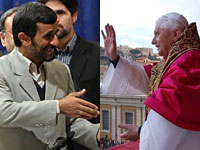Iran may use Pope Benedict XVI to stave off potential US attack
According to several well-placed Rome sources, Iranian officials are quietly laying the groundwork necessary to turn to Pope Benedict XVI and top Vatican diplomats for mediation if the showdown with the United States should escalate toward a military intervention. The 80-year-old Pope has thus far steered clear of any strong public comments about either Iran's failure to fully comply with U.N. nuclear weapons inspectors or the drumbeat of war coming from some corners in Washington. But Iran, which has had diplomatic relations with the Holy See for 53 years, may be trying to line up Benedict as an ace in the hole for staving off a potential attack in the coming months.

"The Vatican seems to be part of their strategy," a senior Western diplomat in Rome said of the Iranian leadership. "They'll have an idea of when the 11th hour is coming. And they know an intervention of the Vatican is the most open and amenable route to Western public opinion. It could buy them time."
If the situation heats up in the coming months, the question of exactly what role the Vatican would play could become pivotal. Says one high-ranking Vatican official: "The Iranians look to the Holy See with particular attention. It is born from our common religious matrix. This could be utilized to offer ourselves as an intermediary if the crisis worsens." Among the potential moves: a forceful series of public appeals by the Pope, a Vatican emissary sent to Washington and Tehran, or a visit to the Vatican by Iranian President President Mahmoud Ahmadinejad, Time reports.
Pravda.Ru has interviewed Dr. William F. Schulz, Senior Fellow of Center for American Progress, who works in the area of religion and public policy, to find out whether it is possible for Iran to use Pope Benedict XVI as its secret weapon.
Pravda.Ru: If Pope Benedict XVI delivers a speech supporting Iran could it stave off a potential US attack?
William Schulz: The Vatican strongly opposed US intervention in Iraq in 2003 and that appeared to make little difference in US decision-making. Even granting that it is now a different era and a different pope, that experience leads me to doubt that, if the US is determined to attack Iran, the Pope's entreaties could stop it from doing so. On the other hand, in the face of the debacle in Iraq, the US administration is at least marginally more attentive to international opinion now than in 2003 and so an appeal from the Pope, coupled with those from other international leaders, particularly allies, might encourage a more extended period of negotiation.
Pravda.Ru: Is Vatican’s peacemaking initiative strong enough to lead to confessional friendship between Catholicism and Islam?
William Schulz: I strongly doubt that a rapprochement between the Vatican and Iran will in and of itself "lead to confessional friendship between Catholicism and Islam." The barriers between the two faiths are both generations in the making and exacerbated by the current traumas related to terrorusm. Moreover, Iran is but one Islamic country among many (and a Shiite country at that) that is feared and in some cases even loathed by other Islamic regimes, such as that of Saudi Arabia.
It would take far more than a verbal appeal by the Pope on Iran's behalf (which, after all, would be motivated more by geopolitical concerns than by a newfound sympathy on the Pope's part for Islam as a religion) to bring deep reconciliation between these two great faith traditions.
Prepared by Alexander Timoshik
Pravda.Ru
Subscribe to Pravda.Ru Telegram channel, Facebook, RSS!


